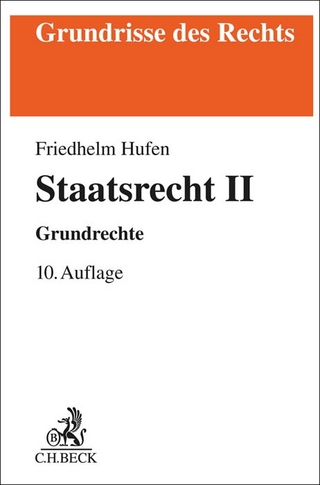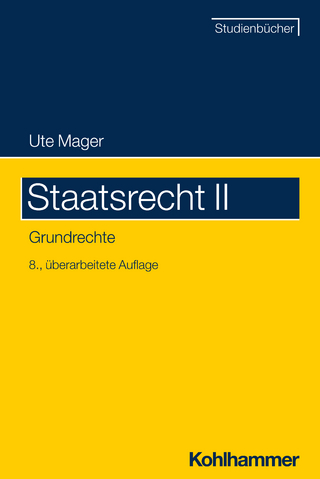
Disinformation, Misinformation, and Democracy
Cambridge University Press (Verlag)
978-1-009-37328-9 (ISBN)
In today's digital age, the spread of dis- and misinformation across traditional and social media poses a significant threat to democracy. Yet repressing political speech in the name of truth can also undermine democratic values. This volume brings together prominent legal scholars from democracies worldwide to explore and evaluate different regulatory approaches for addressing this complex problem – all taking into account that the cure must not be worse than the disease. Using a comparative lens, the book offers important and novel insights into methods ranging from national regulation of politicians' speech to empowering civil-society groups that are well-positioned to blunt the effects of disinformation and misinformation. The book also provides solutions-oriented recommendations for policymakers, judges, legal practitioners, and scholars seeking to promote democratic values by encouraging free political speech while combatting disinformation and misinformation. This title is also available as Open Access on Cambridge Core.
Ronald J. Krotoszynski, Jr. is the John S. Stone Chair, Director of Faculty Research, and Professor of Law at the University of Alabama School of Law. He is the author of numerous law review articles and several books, including Free Speech as Civic Structure (2024) and The Disappearing First Amendment (2019). András Koltay is Research Professor at the University of Public Service (Budapest), and Professor of Law at Pázmány Péter Catholic University (Budapest). His principal research has been concerned with freedom of speech, personality rights and media regulation. He is the author of New Media and Freedom of Expression (2019). Charlotte Garden is the Julius E. Davis Professor of Law at the University of Minnesota. Much of her scholarship and public commentary considers the relationship among the First Amendment, labor unions, and American democracy. She is a co-editor of The Cambridge Handbook of US Labor Law for the Twenty-First Century.
1. Disinformation, misinformation and democracy: defining the problem, identifying potentially effective solutions, and the merits of a using a comparative legal approach Ronald J. Krotoszynski; Part I. Theoretical Approaches to the Disinformation Problem: 2. The internet, democracy and misinformation Robert C Post; 3. Democratic freedom of expression and disinformation Andrew T Kenyon; Part II. The Case of Government Disinformation: 4. Communication of state authorities – the power of the office Indra Spiecker genannt Döhmann; 5. Public officials' lies and their effects for the proliferation of disinformation: another way to approach the crisis Eduardo Bertoni; Part III. Regional Regulatory Approach to Disinformation – Europe: 6. Freedom of expression and the regulation of disinformation in the European union András Koltay; 7. The fight against disinformation in the council of Europe, and the relevant case law of the European court of human rights Bernát Török; Part IV. National Approaches to Disinformation: 8. The perils of fundraising using the disinformation of the big lie Ciara Torres-Spelliscy; 9. Fake news under siege: a century of regulation in chile John Charney; 10. The battle against disinformation: legislative challenges in South Korea Ahran Park; 11. Disinformation, misinformation and democracy: an Indian constitutional perspective Gautam Bhatia; 12. Disinformation and democracy in Africa and South Africa Joanna Botha; 13. Navigating the nexus of elections, technology and democracy amid escalating disinformation and misinformation challenges in Kenya Victoria Miyandazi, Lucianna Thuo; Part V. Civil Society and Tackling Disinformation: 14. Knowledge institutions and resisting 'truth decay' Vicki C Jackson; 15. Freeing speech at work: journalists' unions, workplace democracy, and political democracy Charlotte Garden; 16. Afterword: for whose benefit is the freedom of speech? Vincent Blasi.
| Erscheinungsdatum | 03.09.2024 |
|---|---|
| Zusatzinfo | Worked examples or Exercises |
| Verlagsort | Cambridge |
| Sprache | englisch |
| Themenwelt | Recht / Steuern ► Allgemeines / Lexika |
| Recht / Steuern ► EU / Internationales Recht | |
| Recht / Steuern ► Öffentliches Recht ► Verfassungsrecht | |
| Sozialwissenschaften ► Kommunikation / Medien ► Journalistik | |
| Sozialwissenschaften ► Kommunikation / Medien ► Medienwissenschaft | |
| Sozialwissenschaften ► Politik / Verwaltung ► Politische Systeme | |
| Sozialwissenschaften ► Politik / Verwaltung ► Vergleichende Politikwissenschaften | |
| Wirtschaft | |
| ISBN-10 | 1-009-37328-5 / 1009373285 |
| ISBN-13 | 978-1-009-37328-9 / 9781009373289 |
| Zustand | Neuware |
| Informationen gemäß Produktsicherheitsverordnung (GPSR) | |
| Haben Sie eine Frage zum Produkt? |
aus dem Bereich


